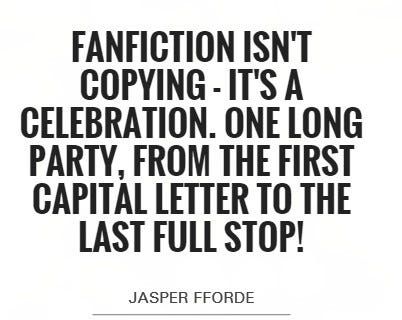2 | What's up, Fanfic?


Since you have found our profile, you likely already know what fanfiction is, but do you really?
Fan fiction or fanfiction (also abbreviated to fan fic, fanfic, fic, or FF) is in and of its core fiction that is written by fans for fans. It is a piece of literature that draws characters, settings, or even whole concepts from somewhere else as a foundation and then adds, builds, and creates new life into these very aspects. Fan fiction can range from a couple of sentences to an entire novel, and to the contrary misconception some people have, it's not stealing to write fanfiction. That isn't to say that copyright can't be a topic of concern if written incorrectly, but so is it for any genre in the literary world.
A true fanfiction writer does NOT claim to be the original creator of the source material. The original creator wholeheartedly retains the source material, but the written fiction created by the fan, whether adding characters and settings or both, belongs to the fanwriter.

Opinions about fanfiction vary widely; it's often met with skepticism or dismissed altogether. However, much like how rap music evolved from its underground roots to a mainstream genre, fanfiction has undergone a similar transformation and surged into popular culture in recent decades, becoming a significant part of the modern literary palette.
From Star Trek fanzines in the 1960s to online forums dedicated to Harry Potter in the early 2000s, fanfiction has always been driven by a deep love for existing narratives and characters. But fanfiction isn't a new invention; its origins can be traced back to the 14th century when writers like William Shakespeare practiced early forms of fanfiction through theatrical plays like "Romeo and Juliet," "Othello," and "The Winter's Tale," which were based on existing stories from his time and today holds much cultural value. Other examples of well-known fanfiction are:
The After series is considered to be based on Harry Styles.
Poison in Paradise is considered to be based on Star Wars.
My Immortal is considered to be based on Harry Potter.
50 Shades of Grey is considered to be based on Twilight.
The Draco Trilogy is considered to be based on Harry Potter.
The Very Secret Diaries is considered to be based on The Lord of the Rings.
Paradise Lost is considered to be based on the Book of Genesis.
Divine Comedy is considered to be based on the Catholic Doctrine.
Demon Copperhead is considered to be a modern AU retelling of David Copperfield.
A Thousand Acres is considered to be a modern retelling of King Lear.
March is considered to be a modern parallel retelling of Little Women.
The Final Solution is considered to be an unabashed piece of Sherlock Holmes fanfiction
Aeneid is considered to be based on the Iliad.
The list goes on and on, and this is but a few examples.
Today, the internet has revolutionized communication and content creation, providing fans with unprecedented opportunities to create, share, discuss, and celebrate their interpretations of beloved stories and characters. Fanfic, the profile you're currently on, continues this tradition by offering fans worldwide a platform to explore the creative potential of their favorite fandoms. We're here to inspire, entertain, and unite people from all walks of life through the power of fandoms.

Fanfic, like any other genre, has its rightful place and, along with it, a bunch of terminology and jargon that encompass the richness and diverse genre that is Fanfic. Here are some terms and concepts to help you better understand the world of fanfiction.
Once more, you can also check out our How to Write Fanfiction help book for the more in-depth knowledge shared by various writers in the genre!
*********
Fan:
noun: fan; plural: fans
Is a person who has a strong interest in or admiration for a particular person or thing.
Fandom:
Refers to the state of being a devoted fan of something/someone, taking time to passionately learn as much as possible regarding this area of interest.
Fandom can be enjoyed by an individual or a whole crowd of people at the same time, usually, the enjoyment factor of fandom lies in the common interest and interaction amongst other fans. A bonding experience between individuals who enjoy the same show/movie/music/comics /books/bands/celebrity... Whatever the area of interest/admiration might be.
Canon:
This is the 'official' material the Fandom is based on, as in the original facts/context that fanfiction writers use to build their story. This is what makes a fanfiction story recognizable as part of a specific fandom.
Fanon:
This is often used in contrast to canon. Essentially, it is a fandom-wide idea or belief. It doesn't mean everyone believes in or likes it, but it's shared by enough fans to be notable and recognized. People will often talk about fanon characterizations of characters, which is when a character has qualities that aren't explicitly canon but are very prevalent in fanfiction. As long as it's an idea created by fans and is shared by enough fans, it's fanon.
Headcanon:
A sub-branch of fanon is actually called "headcanon." When someone invents a piece of fanon they really believe in, but nothing supports it canonically, it may not be accepted as a general part of the fandom, but it may still be something a fan personally believes in; it thus becomes his or her personal "headcanon."
Alternate Universe (AU):
This refers to the fanfiction story being set in an alternate universe than the canon of the fandom. It refers to the fact that the world the characters live in is changed from the canon (original) universe.
Alternate Reality (AR):
This refers to the fanfiction story being set in an alternate reality than the canon of the fandom, but the world (universe) is still the same. It refers to the fact that the reality of the characters is different from the canon (original) story; for example, the wizarding world exists, but Harry never went to Hogwarts.
Alternate Timeline (AT):
This refers to fanfiction that takes place in a time other than the canon or changes the timeline itself, like placing Mr. Darcy in a fancy penthouse in modern-day England.
A special case of this is TT (Time Travel), where characters travel back or forth in time like the Justice League in Smallville.
Fanzine:
This is a form of fanfiction made of the words fan and magazine. It is a non-professional and non-official publication produced by and for people who are fans of something. Those interested in manga and anime have the Japanese term dōjinshi, which is an independently published manga or novel based on existing manga, anime, and video game franchises. These fall under the category of fanzine.
********
There are many more terms beyond these mentioned here. We are just highlighting a few. We might add some new terms on occasion, but this is really just a peek at what's in the How to Write Fanfiction guide

The question asked is a personal one that you can only answer yourself, but we will try to give you a general background so you can make an informed decision. Fanfiction is what we consider a hybrid genre. That means the genre blends themes and elements from two or more different genres. You can easily find romance fanfiction as you an find horror or comedy. It entirely depends on the fandom the fanfiction is based upon and what spin the writer has taken with the story. Are you interested in knowing more? What are the pros and cons of fanfic? What are the various aspects of it?
Take a look at our guide: "How To Write Fanfiction"
And if you already have extensive knowledge of all these terms and the art of writing Fanfiction, why not check out the guide and find out how you can contribute to it?

Reference
1. Music genre evolution: https://en.wikipedia.org/wiki/Underground_hip_hop
2. Several examples of various famous or infamous: fanfiction https://bookshop.tumblr.com/post/37075331312
3. Historical aspects of fanfiction: https://en.wikipedia.org/wiki/Fan_fiction
Bạn đang đọc truyện trên: AzTruyen.Top